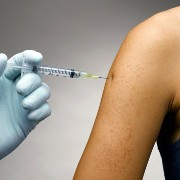 Photo: Getty Images
Photo: Getty Images
According to National Foundation of Infectious Disease (NFID), diseases that are preventable with vaccines kill more Americans every year than from traffic accidents, breast cancer and HIV.
Medicines treat and cure disease. However, vaccines prevent diseases and they are required through our lifetime. Adult vaccines protect and prevent against illness as well as death. For example, the NFID stated adults are 25 times more likely to die from chickenpox than children.
Vaccines also protect our children against illness and possible debt from hospitalizations or days off work due to illness.
The vaccines you need as an adult or senior are based on previous immunizations, your age and future travel destinations.
The Centers for Disease Control and Prevention recommends the following immunizations for adults 19-64 years of age:
· Flu (one dose per year)
· Tetanus, diphtheria, whooping cough (substitute one-time dose of Tdap for Td booster and a boost with Td every ten years)
· Chickenpox, also known as varicella. Adults who have never had chickenpox or never received the chickenpox vaccine should be vaccinated. Two vaccinations will be needed at least 28 days apart. However, certain groups of people should not be vaccinated. Those include:
1. People who have ever had a life-threatening allergic reaction to a previous dose of chickenpox vaccine, to gelatin or to the antibiotic neomycin
2. Those who are moderately or severely ill at the time of the vaccination
3. Pregnant women (women should not get pregnant for one month after getting the chickenpox vaccine)
· Measles, mumps, rubella (1 or 2 doses between the ages 19-49).
· Shingles, also known as herpes zoster (one time vaccine for those over 60)
· Human papillomavirus (HPV) infection (three doses for women 19-26 years)
The CDC recommends the following vaccines for high risk adults between the ages 19-64:
· Pneumococcal (one time vaccination before 60)
· Meningococcal (one or more doses)
· Hepatitis A (two doses)
· Hepatitis B (3 doses)
According to the CDC, 66 percent of adults 65 years and older received the flu vaccination in 2009. Each year, more than 36,000 people in the U.S. die from the flu and the elderly are the majority of these deaths. The CDC recommends adults 65 years and older receive the flu vaccine annually. Also, the CDC recommends the following vaccines for seniors:
· Flu (one dose annually)
· Shingles (one single dose)
· Pneumonia (one single dose)
· Tetanus, Diphtheria, Whooping Cough (Td booster every 10 years)
Sources:
http://www.cdc.gov/vaccines/default.htm
http://www.adultvaccination.org/index.htm
http://www.cdc.gov/Features/AdultImmunizations/
http://www.cdc.gov/vaccines/recs/schedules/downloads/adult/adult-schedule-bw.pdf
http://www.cdc.gov/vaccines/pubs/downloads/f_imz_oldadults.rtf




Add a CommentComments
There are no comments yet. Be the first one and get the conversation started!